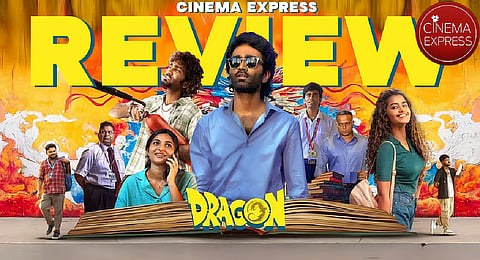
“Dragon” Movie Review: A Riotous Campus Saga with Clever Writing & Real-World Grit

Rating: ★★★★☆ (4/5)
Director: Ashwath Marimuthu
Cast: Pradeep Ranganathan, Mysskin, Anupama Parameswaran, Kayadu Lohar, George Maryan
Genre: Coming-of-Age, Campus Drama, Comedy-Drama
Language: Tamil
Runtime: ~2 hrs 30 mins
🎓 Introduction: An Unconventional Campus Journey
Dragon, directed by Ashwath Marimuthu, isn’t your typical campus film. It blends coming-of-age drama with satirical realism, capturing the life of a morally grey protagonist navigating a complex academic world. At its heart, it’s a story about flawed youth, personal transformation, and the social systems that shape us — all wrapped in a clever, highly entertaining narrative.
Ashwath delivers a film that’s self-aware, subversive, and emotionally charged — striking a balance between laughs, life lessons, and unflinching moments of darkness.
🧨 D Ragavan: The ‘Dragon’ You Don’t Root For… At First
Pradeep Ranganathan plays D Ragavan, a student once known for academic brilliance, now a ‘bad boy’ navigating college politics and moral chaos. He’s arrogant, emotionally volatile, and sometimes downright toxic — but he’s also painfully human.
What’s remarkable is that the film doesn’t try to make him instantly likeable. Instead, it charts his growth from a walking red flag to someone striving for redemption. He stumbles, learns, and slowly earns your empathy, if not admiration.
🎭 Performances: Mysskin & George Maryan Steal the Show
-
Mysskin as the enigmatic professor Mayilvahanan delivers a standout performance. He could’ve easily been written as a caricatured villain, but Ashwath adds nuance. Think of him as a darker mirror to SJ Suryah’s Bhoominathan from Don.
-
George Maryan, as Ragavan’s father, is heartwarming and poignant in emotional scenes, though occasionally tipping into melodrama.
-
Anupama Parameswaran and Kayadu Lohar deliver capable performances, though their characters aren’t given enough backstory to fully resonate.
🎬 Writing & Direction: Satire, Symbolism, and Realism Collide
The screenplay thrives on smart callbacks and a self-aware tone. Whether it’s the “Kutty Dragon” mass scene with an algorithm recitation mid-fight or the symbolic cigarette stub incident, Ashwath uses cinematic flair without overindulgence.
Despite nods to ‘mass’ cinema, the film remains grounded in a believable portrayal of Tamil campus culture — complete with pokkiris, ID card twirls, and all.
What elevates Dragon is how it takes familiar campus tropes and cleverly subverts them. For example, a second female lead in the second half doesn’t spiral into a clichéd love triangle. These smart choices keep the narrative refreshing and authentic.
💥 Highs and Lows: Not Always Balanced
While Dragon delivers laugh-out-loud moments and biting insights, a few scenes feel tonally inconsistent — especially those involving verbal and near-physical abuse in emotionally charged confrontations. These moments could have been handled with more sensitivity, considering the character arc being developed.
Similarly, Ragavan’s abrupt transition from “problematic” to “perfect boyfriend” is rushed and a bit too idealistic, especially in a film that otherwise celebrates grey areas.
🧠 Themes & Takeaways: Morality, Growth, and Redemption
At its core, Dragon questions the glorification of toxic masculinity and explores the redemptive power of education and self-awareness. Ragavan’s journey reflects how one’s past doesn’t define their future — if they’re willing to do the hard work of change.
The film speaks directly to Gen Z and young millennials who are juggling social media expectations, parental pressure, and personal identity. It taps into youth anxieties while refusing to sugarcoat the consequences of bad choices.
✅ Final Verdict: A Smart, Stylish, Subversive Campus Film
Dragon is one of those rare campus dramas that resonates with both the head and the heart. It delivers laughs, emotion, mass moments, and moral dilemmas without losing its narrative rhythm. While some tonal missteps and character arcs could’ve used more polish, the film ultimately lands where it matters.
Ashwath Marimuthu and Pradeep Ranganathan have crafted a relatable youth anthem that’s sure to earn a spot in classroom discussions and meme pages alike.


Leave a Reply